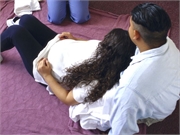- Could Your Grocery Store Meat Be Causing Recurring UTIs?
- Are You Making This Expensive Thermostat Error This Winter?
- Recognizing the Signs of Hypothyroidism
- 10 Strategies to Overcome Insomnia
- Could Artificial Sweeteners Be Aging the Brain Faster?
- Techniques for Soothing Your Nervous System
- Does the Water in Your House Smell Funny? Here’s Why
- Can a Daily Dose of Apple Cider Vinegar Actually Aid Weight Loss?
- 6 Health Beverages That Can Actually Spike Your Blood Sugar
- Treatment Options for Social Anxiety Disorder
Is Childbirth More Dangerous in Rural Areas?

If you are pregnant and live in a rural area of the United States, new research shows that you’re at higher risk of life-threatening complications or death during or after childbirth.
“Our study suggests that geographic disparities may put rural women at an increased risk of requiring lifesaving interventions during or immediately after delivering a baby,” said study senior author Dr. Lindsay Admon. She’s an obstetrician-gynecologist at Michigan Medicine’s Von Voigtlander Women’s Hospital, in Ann Arbor.
“Policies and programs aiming to improve maternal health and reduce adverse events associated with delivery must address the unique health needs and challenges faced by rural women,” Admon added in a University of Michigan news release.
In the study, her team analyzed 6.8 million births nationwide between 2007 and 2015, and found that deliveries requiring emergency lifesaving treatment and mothers’ deaths rose from 109 to 152 per 10,000 childbirth hospitalizations during that time.
The researchers also found that rural women were 9% more likely to have a dangerous childbirth situation than urban women, with about 4,400 more cases among rural women during the study period.
The findings were published in the December issue of the journal Health Affairs.
The study’s lead author, Katy Kozhimannil, said, “Where you live shouldn’t dictate the outcome of your pregnancy.” Kozhimannil is director of the University of Minnesota’s Rural Health Research Center.
“In rural areas, where there is declining access to obstetric services, it is alarming that more and more people are facing severe maternal morbidity and mortality when giving birth,” she noted.
Each year, tens of thousands of U.S. women require emergency care — such as blood transfusions, emergency hysterectomy, or treatment for heart failure or stroke — to save their lives during or immediately after childbirth.
The incidence of such cases nearly tripled between 1998 and 2014, and there was a sharp rise in childbirth-related deaths among mothers, with nearly 700 such deaths a year, the study found.
More information
The U.S. National Institute of Child Health and Human Development has more on labor and delivery complications.
Source: HealthDay
Copyright © 2026 HealthDay. All rights reserved.










